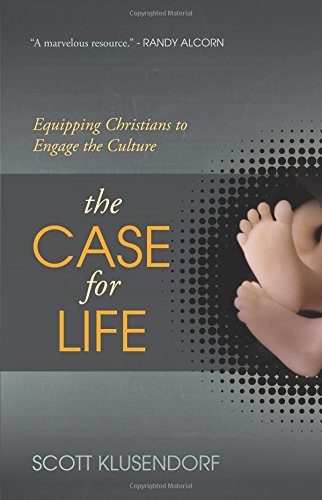A Brief Book Summary from Books At a Glance
About the Author
Scott Klusendorf is president of Life Training Institute, where he trains pro-life advocates to defend their views. A passionate and engaging platform speaker, Klusendorf’s pro-life presentations have been featured by Focus on the Family, Truths That Transform, and American Family Radio. Scott is a graduate of UCLA and the author of Pro-Life 101.
Introduction
This book presents a positive case for the pro-life position as well as rebutting pro-abortion arguments. It is conversant with the academic, philosophical arguments, but is written to be accessible and helpful to all serious readers. Klusendorf provides helpful keys and strategies for carrying on debates and discussions about abortion. He clarifies the issues and teaches the reader how to identify and focus on the real heart of the arguments that are being discussed.
Table of Contents
Preface
Introduction
Chapter 1 What’s the Issue?
Chapter 2 What Is the Unborn?
Chapter 3 What Makes Humans Valuable?
Chapter 4 Is Embryonic Stem Cell Research Morally Complex?
Chapter 5 The Ground Rules, Part 1: Can You Name My Claim?
Chapter 6 The Ground Rules, Part 2: Is Moral Neutrality Possible?
Chapter 7 Foundations: Does God Matter? (Or Am I Just Matter?)
Chapter 8 Dead Silence: Does the Bible Justify Abortion?
Chapter 9 From Debate to Dialogue: Asking the Right Questions
Chapter 10 The Coat Hanger Objection: “Women Will Die from Illegal Abortions”
Chapter 11 The Tolerance Objection: “You Shouldn’t Force Your Views on Others”
Chapter 12 The Single Issue Objection: “Pro-Lifers Should Broaden Their Focus”
Chapter 13 The Hard Cases Objection: “Rape Justifies Abortion”
Chapter 14 The “I Don’t Like You” Objection: “Men Can’t Get Pregnant” and Other Personal Attacks
Chapter 15 The Bodily Autonomy Objection: “It’s My Body, I’ll Decide”
Chapter 16 Equip to Engage: The Pro-Life Pastor in the Twenty-First Century
Chapter 17 Healed and Equipped: Hope for Post-Abortion Men and Women
Chapter 18 Here We Stand: Co-Belligerence without Theological Compromise
Chapter 19 Can We Win? How Pro-Life Christians are Making an Extraordinary Impact
Appendix: Training Resources
Summary
Chapter 1
What’s the Issue?
Many Christians are caught off guard when the topic of abortion comes up. It is easy to get side-tracked, but we need to remember there is one great issue: What is the unborn? Pro-abortion arguments assume that the unborn is not a human being. Nobody supports a woman’s right to kill her toddler, nor do people think the government shouldn’t criminalize child abuse. Pro-abortion arguments only seem to work because they’ve presupposed the fetus is not a human being. We need to keep focused on this one issue, and then we need to argue that the unborn is in fact a human being. If the unborn is human, then it is morally wrong to end its life, but if it is not human, abortion is not even a moral issue. The unborn differ from other humans in terms of size, environment, and degree of dependency, but these factors are irrelevant to the nature of a human being (such differences exist amongst toddlers, teens, adults, and seniors). Ectopic pregnancies may need to be ended to save the life of the mother, but the goal is to save one life, instead of seeing both the mother and unborn child die.
Chapter 2
What is the Unborn?
The unborn are not different entities from human beings—they are human beings at the earliest stage of development. Life begins at conception because there is no time in our development when we switch our nature. Embryos have all the marks of life: response to stimuli, metabolic processes, and cellular growth. Embryos are whole organisms, unlike our body’s cells which are parts of the whole, and which do not develop into a whole organism. Individual cells continue to live after bodily death, but death is marked by the loss of coordination between the cells for the whole. Embryos are not analogous clumps of cells. If an embryo splits into twins, this does not mean it wasn’t a whole before the split, it means that one whole split into two wholes. There are many spontaneous miscarriages, but this is different from intentional action. Furthermore, high infant mortality rates in some countries do not justify infanticide. Many academic philosophers who support abortion on other grounds acknowledge that the embryo is human. Embryos are not constructed piece-by-piece; they develop through the power of their internal nature.
Chapter 3
What Makes Humans Valuable?
Christians believe that every human being…
[To continue reading this summary, please see below....]The remainder of this article is premium content. Become a member to continue reading.
Already have an account? Sign In
